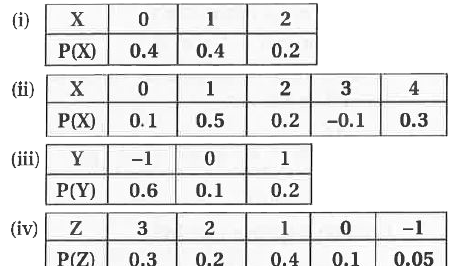Probability of solving specific problem independently by A and B are 12 and 313 respectively. If both try to solve the problem independently, find the probability that
(i) the problem is solved (ii) exactly one of them solves the problem.Solution in Gujrati
The correct Answer is:(i)23,(ii)12
Step by step video, text & image solution for Probability of solving specific problem independently by A and B are (1)/(2) and 3(1)/(3) respectively. If both try to solve the problem independently, find the probability that (i) the problem is solved (ii) exactly one of them solves the problem. by Maths experts to help you in doubts & scoring excellent marks in Class 12 exams.
Topper's Solved these Questions
- BOOK - KUMAR PRAKASHANCHAPTER - PROBABILITYEXERCISE - EXERCISE -13.314videos
PROBABILITY
- BOOK - KUMAR PRAKASHANCHAPTER - PROBABILITYEXERCISE - EXERCISE -13.420videos
PROBABILITY
- BOOK - KUMAR PRAKASHANCHAPTER - PROBABILITYEXERCISE - EXERCISE -13.123videos
PROBABILITY
- BOOK - KUMAR PRAKASHANCHAPTER - MATRICES EXERCISE - Practice Paper - 3 (Section - D)1videos
MATRICES
- BOOK - KUMAR PRAKASHANCHAPTER - RELATIONS AND FUNCTIONS EXERCISE - Practice Paper - 1 (Section - D)2videos
RELATIONS AND FUNCTIONS
Similar Questions
An urn contains 5 red and 5 black balls. A ball is drawn at random, its colour is noted and is returned to the urn. Moreover, 2 additional balls of the colour drawn are put in the urn and then a ball is drawn at random. What is the probability that the second ball is red?
02:24View SolutionState which of the following are not the probability distributions of a random variable. Give reasons for your answer.
 05:08View Solution
05:08View SolutionGiven that E and F are events such that P(E)=0.6,P(F)=0.3and(E∩F)=0.2, find P(E|F) and P(F|E)
03:46View SolutionFor matrix A=⎡⎢⎣11112−32−13⎤⎥⎦ . Prove that , A3−6A2+5A+11I=0. Hence find A−1 using it .
View SolutionLet : f:N→N be defined by f(n)={n+12 if n is oddn2 if n is even for all n∈N .
State whether the function f is bijective . Justify your answer.09:09View SolutionProbability of solving specific problem independently by A and B are 12and 13respectively. If both try to solve the problem independently find the probability that(i) the problem is solved (ii) exactly one of them solves the problem.
View SolutionProbabilities of solving a specific problem independently by A and B are 12 and13 respectively. If both try to solve the problem independently, find the probability that (i) the problem is solved (ii) exactly one of them solves the problem.
02:51View SolutionProbability of solving specific problem independently by A and B are 12 and 13 respectively. If both try to solve the problem independently, find the probability that (i) the problem is solved (ii) exactly one of them solves the problem.
02:40View SolutionProbability of solving specific problem independently by A and B are 12 and 13 respectively. If both try to solve the problem independently, find the probability that :
(i) the problem is solved
(ii) exactly one of them solves the problem.View SolutionProbability of solving specific problem independently by A and B are and 12 and 13 respectively. If both try to solve the problem independently, find the probability that
i. the problem is solved
ii. exactly one of them solves the problem03:34View SolutionProbability of solving specific problem independently by A and B are 12 and 313 respectively. If both try to solve the problem independently, find the probability that
(i) the problem is solved (ii) exactly one of them solves the problem.03:46View SolutionProbability of solving specific problem independently by A and B are 12 and 13 respectively. If both try to solve the problem independently, find the probability that
(i) the problem is solved (ii) exactly one of them solves the problem.04:13View SolutionProbability of solving specific problem independently by A and B are 12 and 313 respectively. If both try to solve the problem independently, find the probability that
(i) the problem is solved (ii) exactly one of them solves the problem.03:41View SolutionProbability of solving specific problem independently by A and B are 12 and 313 respectively. If both try to solve the problem independently, find the probability that
(i) the problem is solved (ii) exactly one of them solves the problem.04:44View SolutionProbability of solving specific problem independently by A and B are 12 and 313 respectively. If both try to solve the problem independently, find the probability that
(i) the problem is solved (ii) exactly one of them solves the problem.04:55View SolutionProbability of solving specific problem independently by A and B are 12 and 13 respectively. If both try to solve the problem independently, find the probability that (i) the problem is solved (ii) exactly one of them solves the problem.
02:51View Solution

